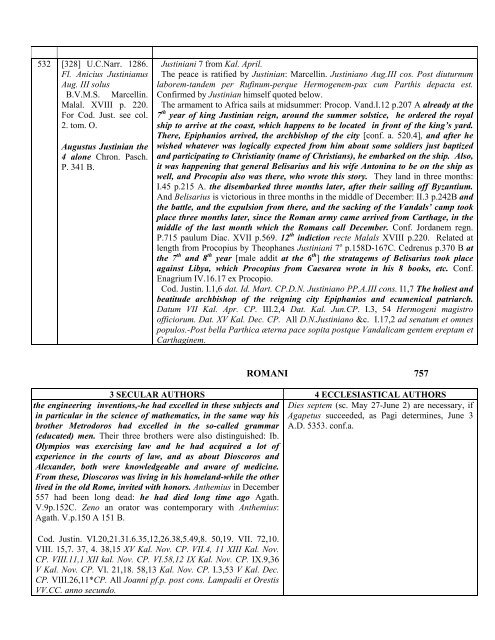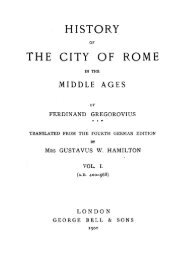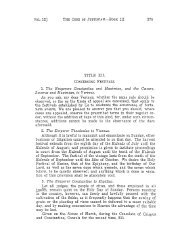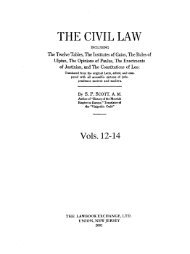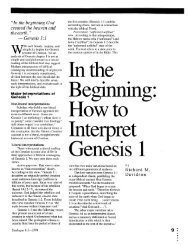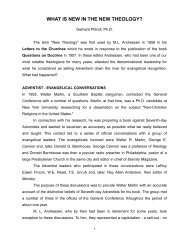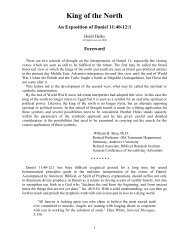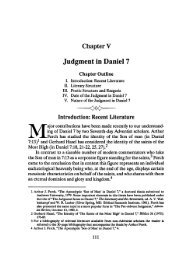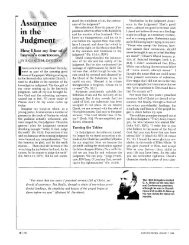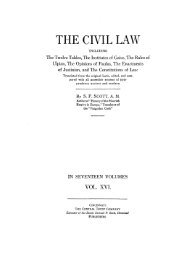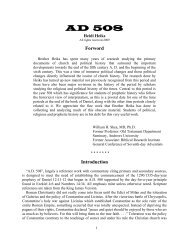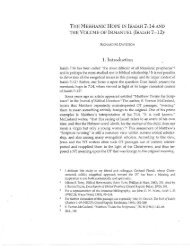FASTI ROMANI ROME AND CONSTANTINOPLE
FASTI ROMANI ROME AND CONSTANTINOPLE
FASTI ROMANI ROME AND CONSTANTINOPLE
You also want an ePaper? Increase the reach of your titles
YUMPU automatically turns print PDFs into web optimized ePapers that Google loves.
532 [328] U.C.Narr. 1286.<br />
Fl. Anicius Justinianus<br />
Aug. III solus<br />
B.V.M.S. Marcellin.<br />
Malal. XVIII p. 220.<br />
For Cod. Just. see col.<br />
2. tom. O.<br />
Augustus Justinian the<br />
4 alone Chron. Pasch.<br />
P. 341 B.<br />
Justiniani 7 from Kal. April.<br />
The peace is ratified by Justinian: Marcellin. Justiniano Aug.III cos. Post diuturnum<br />
laborem-tandem per Rufinum-perque Hermogenem-pax cum Parthis depacta est.<br />
Confirmed by Justinian himself quoted below.<br />
The armament to Africa sails at midsummer: Procop. Vand.I.12 p.207 A already at the<br />
7 th year of king Justinian reign, around the summer solstice, he ordered the royal<br />
ship to arrive at the coast, which happens to be located in front of the king’s yard.<br />
There, Epiphanios arrived, the archbishop of the city [conf. a. 520.4], and after he<br />
wished whatever was logically expected from him about some soldiers just baptized<br />
and participating to Christianity (name of Christians), he embarked on the ship. Also,<br />
it was happening that general Belisarius and his wife Antonina to be on the ship as<br />
well, and Procopiu also was there, who wrote this story. They land in three months:<br />
I.45 p.215 A. the disembarked three months later, after their sailing off Byzantium.<br />
And Belisarius is victorious in three months in the middle of December: II.3 p.242B and<br />
the battle, and the expulsion from there, and the sacking of the Vandals’ camp took<br />
place three months later, since the Roman army came arrived from Carthage, in the<br />
middle of the last month which the Romans call December. Conf. Jordanem regn.<br />
P.715 paulum Diac. XVII p.569. 12 th indiction recte Malals XVIII p.220. Related at<br />
length from Procopius by Theophanes Justiniani 7 o p.158D-167C. Cedrenus p.370 B at<br />
the 7 th and 8 th year [male addit at the 6 th ] the stratagems of Belisarius took place<br />
against Libya, which Procopius from Caesarea wrote in his 8 books, etc. Conf.<br />
Enagrium IV.16.17 ex Procopio.<br />
Cod. Justin. I.1,6 dat. Id. Mart. CP.D.N. Justiniano PP.A.III cons. I1,7 The holiest and<br />
beatitude archbishop of the reigning city Epiphanios and ecumenical patriarch.<br />
Datum VII Kal. Apr. CP. III.2,4 Dat. Kal. Jun.CP. I.3, 54 Hermogeni magistro<br />
officiorum. Dat. XV Kal. Dec. CP. All D.N.Justiniano &c. I.17,2 ad senatum et omnes<br />
populos.-Post bella Parthica æterna pace sopita postque Vandalicam gentem ereptam et<br />
Carthaginem.<br />
<strong>ROMANI</strong> 757<br />
3 SECULAR AUTHORS 4 ECCLESIASTICAL AUTHORS<br />
the engineering inventions,-he had excelled in these subjects and<br />
in particular in the science of mathematics, in the same way his<br />
brother Metrodoros had excelled in the so-called grammar<br />
(educated) men. Their three brothers were also distinguished: Ib.<br />
Olympios was exercising law and he had acquired a lot of<br />
experience in the courts of law, and as about Dioscoros and<br />
Alexander, both were knowledgeable and aware of medicine.<br />
From these, Dioscoros was living in his homeland-while the other<br />
lived in the old Rome, invited with honors. Anthemius in December<br />
557 had been long dead: he had died long time ago Agath.<br />
V.9p.152C. Zeno an orator was contemporary with Anthemius:<br />
Agath. V.p.150 A 151 B.<br />
Cod. Justin. VI.20,21.31.6.35,12,26.38,5.49,8. 50,19. VII. 72,10.<br />
VIII. 15,7. 37, 4. 38,15 XV Kal. Nov. CP. VII.4, 11 XIII Kal. Nov.<br />
CP. VIII.11,1 XII kal. Nov. CP. VI.58,12 IX Kal. Nov. CP. IX.9,36<br />
V Kal. Nov. CP. VI. 21,18. 58,13 Kal. Nov. CP. I.3,53 V Kal. Dec.<br />
CP. VIII.26,11*CP. All Joanni pf.p. post cons. Lampadii et Orestis<br />
VV.CC. anno secundo.<br />
Dies septem (sc. May 27-June 2) are necessary, if<br />
Agapetus succeeded, as Pagi determines, June 3<br />
A.D. 5353. conf.a.


